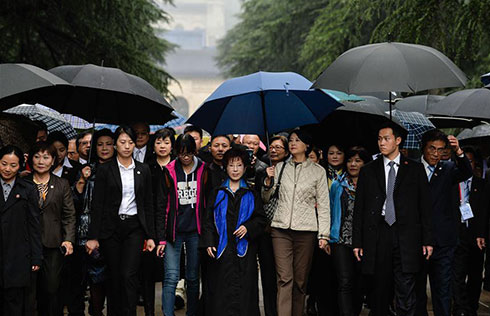Court blacklist derails debt defaulters
|
Police officers escort a man from the Zhongguancun Dinghao Electronic Mall in Beijing after he was detained for refusing to repay an eight-year-old debt. Cao Boyuan / For China Daily |
The government is strengthening measures designed to make life difficult for debtors and people in contempt of court and encourage them to abide by verdicts. Cao Yin reports.
On Oct 8, her first working day after the National Day holiday, Liang Wenjuan, from Chifeng, a city in the Inner Mongolia autonomous region, found herself stranded in Jiuzhaigou, Sichuan province.
The entertainment manager had attempted to buy a plane ticket, but her credit card was rejected because Hongshan District People's Court in the autonomous region had added Liang to its online blacklist of defaulters, which meant she was subject to a range of restrictions, including a ban on buying rail or plane tickets.
The action was taken because Liang had taken a bank loan of 250,000 yuan ($36,850) in 2011, but failed to keep up the repayments. The district court ordered her to repay the debt, but she ignored the ruling.
By October, the combined principal and interest had soared to 400,000 yuan. It was then Liang discovered her name had been added to a blacklist intended to make life so inconvenient for debtors and others who ignore court rulings that they feel compelled to repay outstanding debts and accept the verdict.
"I discovered I couldn't buy a ticket for a flight back home. I was told my name had been added to the blacklist because of my refusal to abide by the court ruling," she said. "Actually, I had almost forgotten about the case. I had to clear the debt straightaway because I was desperate to get home."
Later the same day, one of Liang's employees deposited 400,000 yuan with the court, bringing the five-year dispute to an end. Later, Liang's name was removed from the blacklist and the restrictions were lifted.
The blacklist is increasingly being used to disrupt the lives of defaulters and others who fail to comply with court rulings and ensure full, rapid repayment.
Statistics provided by the Supreme People's Court, the nation's top judicial body, show that between 2013 and last year, the courts concluded 9.44 million verdict-enforcement cases - a rise of more than 28 percent from 2010 to 2012 - and 3.2 trillion yuan was repaid, an increase of 110 percent over the same period.
In March, the top court attributed the developments to the impact of the blacklist and the restrictions levied in conjunction with government departments.
Origins
The blacklist partly has its origins in a 2010 case handled by Yang Haichao, a judge at Haidian District People's Court in Beijing, when a debtor who owed a company 100,000 yuan went to ground.
"I accidentally discovered that he had several thousand yuan in an account at China Agricultural Bank, so I immediately rushed to the bank and froze the account," Yang recalled. "It was a relatively small sum so I thought it might not matter. Later I got a call that changed my mind."
The caller was the debtor, who told Yang he wanted to repay the money as quickly as possible. "I was surprised initially, but I realized he had been forced to pay because I had frozen the account he used for his mortgage payments. He told me that his credit rating at the bank would be affected if didn't pay his mortgage, which made me realize that blocking debtors' assets might be a good way of enforcing verdicts," Yang said.
His idea predated the first defaulters' blacklist, published in 2013, and helped to prompt cooperation with government bodies. "The courts finally took the initiative on verdict enforcement," he said.


























